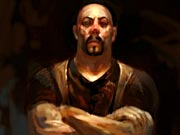Vampire: The Masquerade - Bloodlines Designer Diary #1
Troika Games' joint CEO Leonard Boyarsky begins this series of designer diaries with an overview of both the Vampire role-playing system and how Troika came to work on the project.
Earlier this year, developer Troika Games and publisher Activision took the wraps off of Vampire: The Masquerade - Bloodlines. While the name may seem like a mouthful, the game features the popular pen-and-paper Vampire: The Masquerade role-playing system, in which players, as vampires, conceal themselves among modern human society in accordance with the rules of the "masquerade." However, the game actually includes a great deal of intrigue and conflict between vampires, since most of these creatures have affiliated themselves with clans that are constantly at war with each other. These clans are composed of different vampires that possess different dispositions and different supernatural abilities, including mind control, superhuman strength, and exceptional powers of stealth, to name just a few.

Troika Games intends to take this unusual setting and create an extremely open-ended computer role-playing game that will let you take on the role of a fledgling vampire, join one of the game's seven clans, and explore the seamy underbelly of Los Angeles, California--one of the world's most corrupt cities (according to the game, of course). However, unlike Troika's other role-playing games, Bloodlines will actually feature first-person shooter elements. You'll explore the game's expansive 3D environments and interact with fully 3D characters, and if you choose to, you'll be able to defend yourself by packing serious heat, including sniper rifles, flamethrowers, and submachine guns. Of course, you'll also have your preternatural vampire senses and any new abilities you may receive as a result of your clan affiliation. And to make things even more interesting, Bloodlines will be the first game to license Valve Software's Source engine--the same engine that powers Valve's highly anticipated Half-Life 2.
In this first designer diary, we're joined by Troika joint CEO Leonard Boyarsky, whose body of work includes the recently released Temple of Elemental Evil, Arcanum, and the classic 1997 RPG, Fallout.
Vampires, White Wolves, and Troika Games
Joint CEO, Troika Games/Producer
This is the first entry in a series of developer diaries that will cover the making of Vampire: The Masquerade - Bloodlines. To begin, I thought a brief history of White Wolf and the Vampire: The Masquerade role-playing game was in order.
White Wolf's origin dates back to 1986, when brothers Steve and Stewart Wieck founded a publishing company in Atlanta. It was a small company consisting of a half-dozen guys living in a house and using their front porch as a warehouse. Things changed when the brothers met an RPG designer named Mark Rein-Hagen. Inspired by the mythic and magical heritage of his native Scotland, Mark was co-author of the groundbreaking role-playing game, Ars Magica, a fantasy game set in an alternate medieval world, while still in college. He then established his own company, Lion Rampant. Mark later merged his company with that of the Wieck brothers to create White Wolf. With their first collaborative RPG game, they created the dark and gothic/punk world of Vampire: The Masquerade, where players could create modern stories of tragedy and personal horror.
In this world, vampires roam the streets at night among mortals in a decadent, information-age world. "The kindred," as vampires call themselves, have spent countless centuries secretly preying on humanity and cooperating uneasily among themselves through a clandestine and Machiavellian social order governed by many laws. Prominent among these laws is the tradition of the "masquerade": "Thou shalt not reveal thy true nature to those not of the blood." Disguised as humans, vampires have infiltrated the mortal world and now manipulate its very history.
Playing as a vampire living among humans may sound a little bit like child's play--after all, if you're such a powerful supernatural creature, how difficult can it be to fight humans? But Vampire: The Masquerade has populated the ceaseless nights of immortal existence with hundreds of rival vampires, each with its own powers, agendas, and political structures. Even worse, many of the earliest, most-powerful vampires are still around, controlling their offspring through diabolical machinations that would make Machiavelli jealous. A manipulative vampire can accomplish more by whispering into another's ear or by charming an opponent rather than by drawing a gun or swinging a sword.

In this complex game of power, intrigue, and immortality, those who get caught in its machinations meet "final death." Those who master its rules and challenges may survive for centuries but will pay the bitter price of their humanity. They turn into something other than human--cursed creatures of the night, emotional outcasts who slowly lose their own ability to feel and discern right from wrong. After all, how do you treat normal people if they may end up being nothing more than your next meal? How does one deal with their dark side, the beast, if it suddenly gains control and forces them into acts of violence?
With its unique blend of drama, tragedy, pathos, humor, and horror, the Vampire: The Masquerade campaign setting became a phenomenal success. In fact, Vampire: The Masquerade spawned an entire series of games collectively known as World of Darkness, a setting where ancient monsters such as werewolves, mages, supernatural hunters, and demons pull the strings behind a society of an unaware humanity.
And that's just about where we came into the picture. Who are we, you ask? We're Troika Games. Created by the minds behind Fallout, Troika went on to create the critically acclaimed Arcanum: Of Steamworks and Magick Obscura and, most recently, The Temple of Elemental Evil (we love long names, obviously).
When it came time to do our next game after Arcanum, we decided we wanted to challenge ourselves and move from our comfort zone of making isometric-view role-playing games to trying something completely new and challenging. To this end, we had been speaking with Scott Lynch of Valve about using the new Source technology (the same game technology used to power Half-Life 2) to create a brand-new, groundbreaking first-person RPG. When we brought this idea to Activision, they suggested we use the Vampire license for this new game. So we began to diligently research the World of Darkness and the Vampire system and agreed that it would be a great fit. Placing players face-to-face with the World of Darkness was just too good an idea to pass up.
The first thing we needed to do was to come up with a story and decide how we were going to integrate the Vampire rules into a computer game. To do this, we immersed ourselves in the White Wolf books and came out on the other side with some truly new and unique ideas for a computer RPG. How exactly did we do this? Well, that's what the next diary will be about.
Got a news tip or want to contact us directly? Email news@gamespot.com

Join the conversation